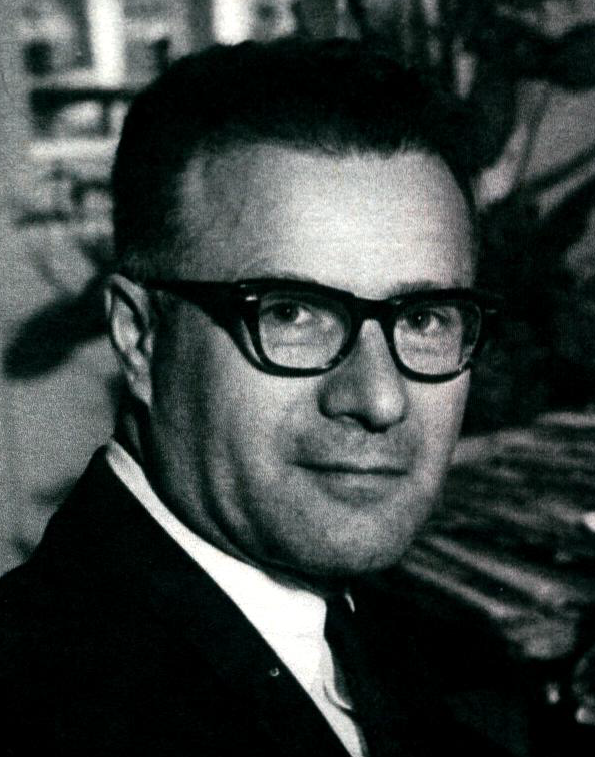Historian of Germany; AHA 50-Year Member
 Marvin L. Edwards, professor emeritus at Clarkson University, passed away on January 31, 2016, at the age of 101. Edwards was born in Kansas City, Missouri, the youngest of seven children. His parents had emigrated from what is now the Czech Republic, and he grew up in a bilingual English-Hungarian household. After graduating from high school in the midst of the Depression, he held many and various jobs: chauffeur, political activist, and meat-packing plant worker—eventually finding employment with the education and training division of the Kansas City Police Department. Edwards volunteered for the US Army in late 1941, and served from 1943 to 1946, participating in campaigns from Normandy to the Ardennes. At the end of the war, he was in charge of the Counter Intelligence Corps in Munich, earning medals for Good Conduct and Honorable Service, among others.
Marvin L. Edwards, professor emeritus at Clarkson University, passed away on January 31, 2016, at the age of 101. Edwards was born in Kansas City, Missouri, the youngest of seven children. His parents had emigrated from what is now the Czech Republic, and he grew up in a bilingual English-Hungarian household. After graduating from high school in the midst of the Depression, he held many and various jobs: chauffeur, political activist, and meat-packing plant worker—eventually finding employment with the education and training division of the Kansas City Police Department. Edwards volunteered for the US Army in late 1941, and served from 1943 to 1946, participating in campaigns from Normandy to the Ardennes. At the end of the war, he was in charge of the Counter Intelligence Corps in Munich, earning medals for Good Conduct and Honorable Service, among others.
Returning to the United States, Edwards enrolled in Columbia University, earning three degrees there during the 1950s. He also met his future wife, Marga Schuhmann, a native of Plauen, Germany, who completed graduate work simultaneously. In 1951, they married and later had a daughter, Audray. While at Columbia, Edwards worked tirelessly within and outside his department, demonstrating his versatility and aptitude as secretary to the Nevis Institute (now Nevis Laboratories, part of Columbia’s physics department). He also managed the correspondence of renowned experimental geneticist Theodosius Dobzhansky, acting as secretary to Columbia’s Institute for the Study of Human Variation. Edwards completed his PhD in 1959.
Specializing in diplomatic and military relations in modern Germany, Edwards published a meticulous account of Gustav Stresemann’s rise to prominence in the World War I–era Reichstag: Stresemann and the Greater Germany, 1914–1918 (1963). Edwards’s scholarship challenged dominant narratives of Stresemann’s role as chancellor in the Weimar Republic by delineating the war years as ideologically determinative in the statesman’s life. Edwards argued that the repudiation of war guilt among the German ruling class had deep roots in the Wilhelmine era, and he traced its manifestations year by year in the postwar epoch. The classes Edwards later offered at Clarkson on the world wars were among the most popular in the department. One of his junior colleagues recalled years later that students were fascinated by the contrast between Edwards’s kind and empathetic demeanor, and the “gravelly, more than vaguely military voice” that complemented his stick-straight posture and enthusiastic teaching.
Edwards was known as a devoted and talented department chair, holding that post first at Arcadia University (then Beaver College), where he mentored new faculty and emerged as a leader in the local chapter of the AAUP. Edwards served again as department head when he moved to Clarkson in 1964. Among other innovative measures, he championed the founding of the institution’s interdisciplinary Canadian Studies Program. He structured the curriculum to encourage students to couple Canadian studies with concentrations in history, political science, and economics—in effect, constructing a double undergraduate major. Edwards was admired as a faculty activist and steadfast adviser, seeking out opportunities, resources, and affiliations for students across upstate New York. In the mid-1980s, he helped Clarkson students organize with the AAUP to stage the first “Take Back the Night” march in Potsdam, New York, in which he, alongside friends and colleagues, carried a banner and marched in solidarity for women’s rights.
Throughout his academic career, Edwards remained in the Active Army Reserve, which allowed his family to stay over on military bases while they traveled—and they took regular cross-country road trips during the summer holidays. Edwards retired from the army at age 60 with the rank of lieutenant colonel.
In the later years of his life, Edwards pursued a wide range of interests and developed his talents as an artist who painted in oils and sketched in pastels and ink. He was also adept in the kitchen; he and Marga often entertained neighbors and former colleagues, and he delighted guests with Hungarian goulash and his famous sponge cake. Edwards kept active in the regional scholarly community following his retirement from Clarkson in 1980, serving for several years as editor of and contributor to The Quarterly, published by the St. Lawrence County Historical Association.
Jill Wharton
Washington, DC

This work is licensed under a Creative Commons Attribution-NonCommercial-NoDerivatives 4.0 International License. Attribution must provide author name, article title, Perspectives on History, date of publication, and a link to this page. This license applies only to the article, not to text or images used here by permission.
The American Historical Association welcomes comments in the discussion area below, at AHA Communities, and in letters to the editor. Please read our commenting and letters policy before submitting.
Tags: In Memoriam Europe Military History
Comment
Please read our commenting and letters policy before submitting.






